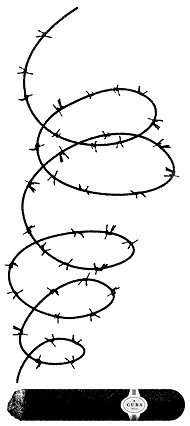Search
Democracy Links
Member's Off-site Blogs
a vassal people .....

In the 10 years since the Guantánamo detention camp opened, the anguished debate over whether to shutter the facility - or make it permanent - has obscured a deeper failure that dates back more than a century and implicates all Americans: namely, our continued occupation of Guantánamo itself. It is past time to return this imperialist enclave to Cuba.
From the moment the United States government forced Cuba to lease the Guantánamo Bay naval base to us, in June 1901, the American presence there has been more than a thorn in Cuba's side. It has served to remind the world of America's long history of interventionist militarism. Few gestures would have as salutary an effect on the stultifying impasse in American-Cuban relations as handing over this coveted piece of land.
The circumstances by which the United States came to occupy Guantánamo are as troubling as its past decade of activity there. In April 1898, American forces intervened in Cuba's three-year-old struggle for independence when it was all but won, thus transforming the Cuban War of Independence into what Americans are still wont to call the Spanish-American War. American officials then excluded the Cuban Army from the armistice and denied Cuba a seat at the Paris peace conference. "There is so much natural anger and grief throughout the island," the Cuban general Máximo Gómez remarked in January 1899, after the peace treaty was signed, "that the people haven't really been able to celebrate the triumph of the end of their former rulers' power."
Curiously, the United States' declaration of war on Spain included the assurance that America did not seek "sovereignty, jurisdiction, or control" over Cuba and intended "to leave the government and control of the island to its people."
But after the war, strategic imperatives took precedence over Cuban independence. The United States wanted dominion over Cuba, along with naval bases from which to exercise it.
Enter Gen. Leonard Wood, whom President William McKinley had named military governor of Cuba, bearing provisions that became known as the Platt Amendment. Two were particularly odious: one guaranteed the United States the right to intervene at will in Cuban affairs; the other provided for the sale or lease of naval stations. Juan Gualberto Gómez, a leading delegate to the Cuban Constitutional Convention, said the amendment would render Cubans "a vassal people." Foreshadowing the Cuban Missile Crisis, he presciently warned that foreign bases on Cuban soil would only draw Cuba "into conflict not of our own making and in which we have no stake."
But it was an offer Cuba could not refuse, as Wood informed the delegates. The alternative to the amendment was continued occupation. The Cubans got the message.
"There is, of course, little or no real independence left Cuba under the Platt Amendment," Wood remarked to McKinley's successor, Theodore Roosevelt, in October 1901, soon after the Platt Amendment was incorporated into the Cuban Constitution.
"The more sensible Cubans realize this and feel that the only consistent thing now is to seek annexation."
But with Platt in place, who needed annexation? Over the next two decades, the United States repeatedly dispatched Marines based at Guantánamo to protect its interests in Cuba and block land redistribution. Between 1900 and 1920, some 44,000 Americans flocked to Cuba, boosting capital investment on the island to just over $1 billion from roughly $80 million and prompting one journalist to remark that "little by little, the whole island is passing into the hands of American citizens."
How did this look from Cuba's perspective? Well, imagine that at the end of the American Revolution the French had decided to remain here. Imagine that the French had refused to allow Washington and his army to attend the armistice at Yorktown. Imagine that they had denied the Continental Congress a seat at the Treaty of Paris, prohibited expropriation of Tory property, occupied New York Harbor, dispatched troops to quash Shays' and other rebellions and then immigrated to the colonies in droves, snatching up the most valuable land.
Such is the context in which the United States came to occupy Guantánamo. It is a history excluded from American textbooks and neglected in the debates over terrorism, international law and the reach of executive power. But it is a history known in Cuba (where it motivated the 1959 revolution) and throughout Latin America. It explains why Guantánamo remains a glaring symbol of hypocrisy around the world. We need not even speak of the last decade.
If President Obama were to acknowledge this history and initiate the process of returning Guantánamo to Cuba, he could begin to put the mistakes of the last 10 years behind us, not to mention fulfill a campaign pledge. (Given Congressional intransigence, there might be no better way to close the detention camp than to turn over the rest of the naval base along with it.) It would rectify an age-old grievance and lay the groundwork for new relations with Cuba and other countries in the Western Hemisphere and around the globe. Finally, it would send an unmistakable message that integrity, self-scrutiny and candor are not evidence of weakness, but indispensable attributes of leadership in an ever changing world. Surely there would be no fitter way to observe today's grim anniversary than to stand up for the principles Guantánamo has undermined for over a century.
Jonathan M. Hansen, a lecturer in social studies at Harvard, is the author of "Guantánamo: An American History."
- By John Richardson at 11 Jan 2012 - 3:29pm
- John Richardson's blog
- Login or register to post comments
Recent comments
1 hour 26 min ago
2 hours 10 min ago
2 hours 29 min ago
2 hours 37 min ago
2 hours 47 min ago
4 hours 55 min ago
5 hours 34 min ago
7 hours 46 min ago
9 hours 35 min ago
13 hours 46 min ago